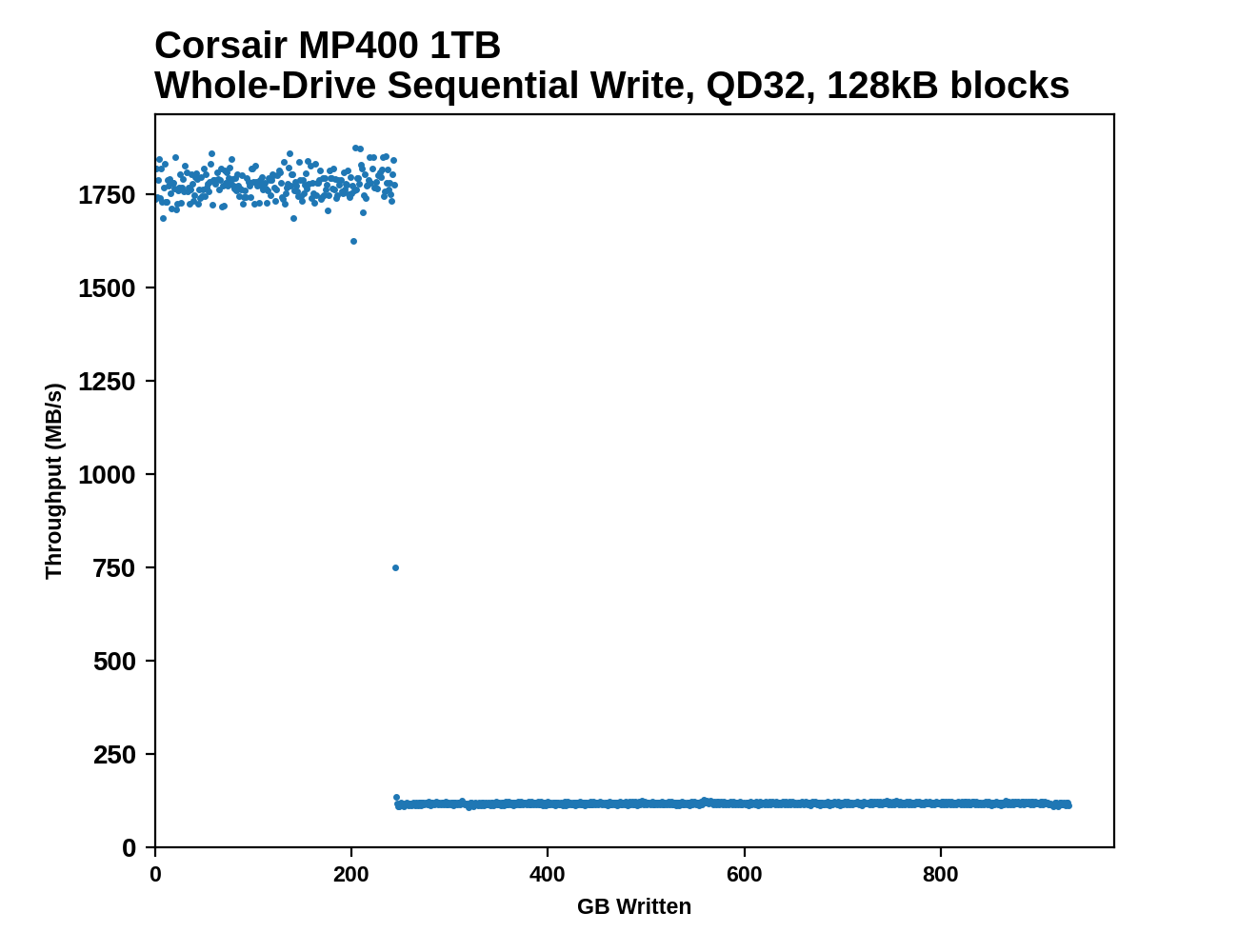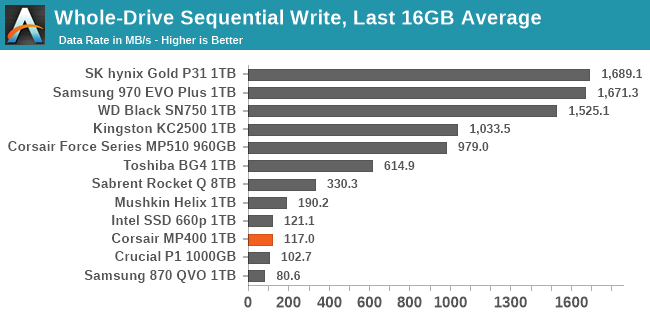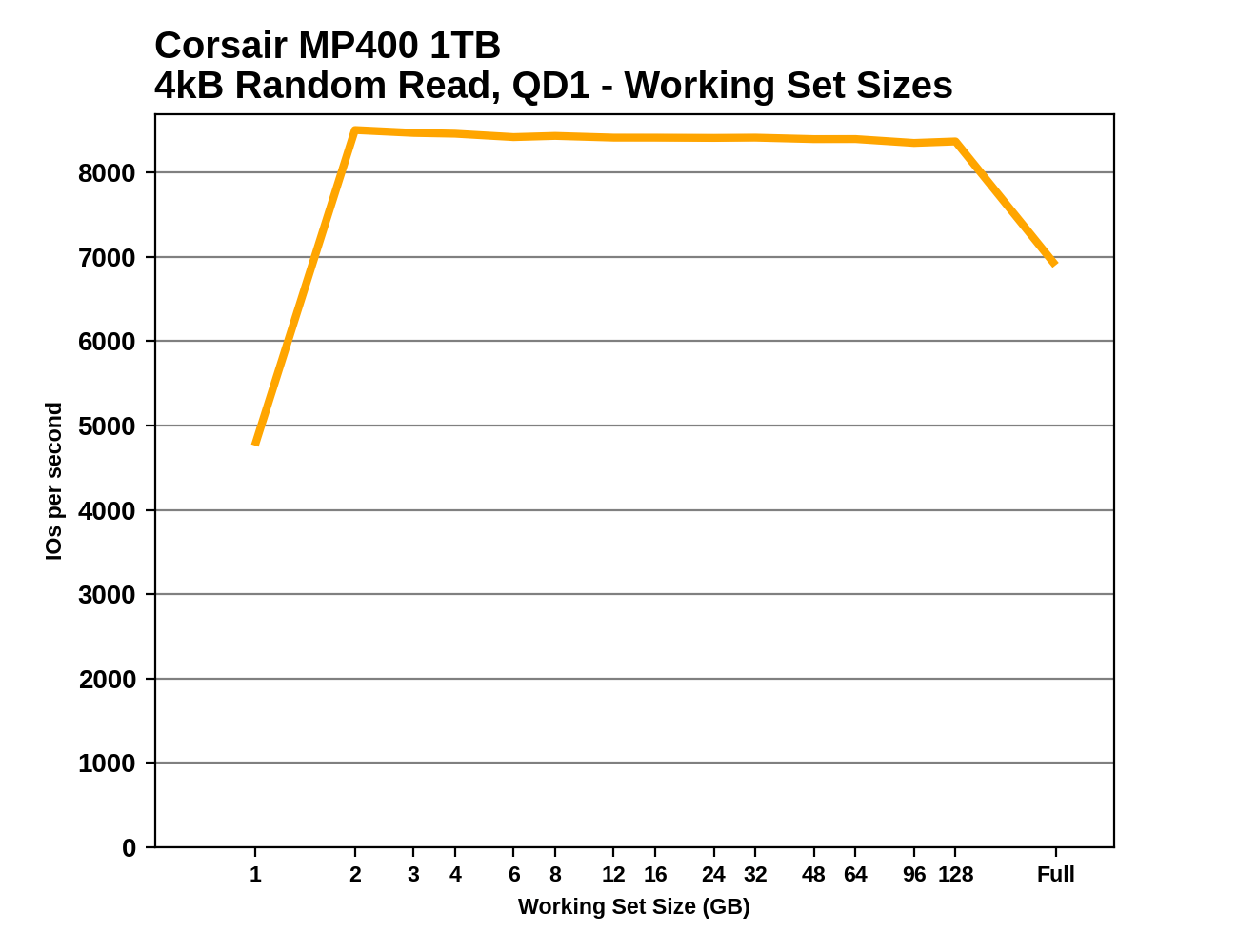The Corsair MP400 1TB QLC NVMe SSD: A Quick Review
by Billy Tallis on December 11, 2020 2:00 PM ESTWhole-Drive Fill
This test starts with a freshly-erased drive and fills it with 128kB sequential writes at queue depth 32, recording the write speed for each 1GB segment. This test is not representative of any ordinary client/consumer usage pattern, but it does allow us to observe transitions in the drive's behavior as it fills up. This can allow us to estimate the size of any SLC write cache, and get a sense for how much performance remains on the rare occasions where real-world usage keeps writing data after filling the cache.
 |
|||||||||
The Corsair MP400 opts for the largest possible SLC cache size, allowing for a quarter of the drive's advertised capacity to be written to the cache before performance plummets. This is the same strategy used by the Sabrent Rocket Q and probably all other QLC drives using Phison controllers. The Intel and Crucial QLC drives based on Silicon Motion's SM2263 controller have somewhat smaller variable-sized SLC caches, while the Samsung QLC SATA drives use the same small SLC cache sizes as their TLC counterparts.
 |
|||||||||
| Average Throughput for last 16 GB | Overall Average Throughput | ||||||||
Overall drive fill performance for the Corsair MP400 is marginally faster than for the other 1TB QLC drives we've tested, but the DRAMless TLC drives and the larger Sabrent Rocket Q are considerably faster. However, all of the budget NVMe drives are clearly much slower for sustained writes than the mainstream and high-end TLC drives.
Working Set Size
 |
|||||||||
The random read latency from the Corsair MP400 is quite similar to what we saw from the 8TB Sabrent Rocket Q, especially for medium to large working sets. The 1TB MP400 doesn't exhibit the same unsteady performance for small working sets as the 8TB Rocket Q, but instead only shows poor performance for the absolute smallest working set size tested.
The performance drop-off when performing random reads across the entire drive is expected and normal, because the Crucial P1 is the only QLC drive in this bunch to include the full 1GB per 1TB of DRAM. Most low-end DRAMless TLC drives will show an even earlier drop in performance, and many of the more mainstream TLC drives that have switched to a lower DRAM ratio will also show the same drop that the Rocket Q and MP400 show.










75 Comments
View All Comments
Oxford Guy - Monday, December 14, 2020 - link
850 EVO is 3D TLC built with a fairly large node.rrinker - Tuesday, December 15, 2020 - link
Yes but the point it how much data people write to their SSD, not the technology used. For the intended audience of these slower drives with lower endurance, the point being made here is that the endurance isn't really an issue. For people with use cases where these drives don't really make sense due to plenty of factors other than endurance, it might be an issue, but the people writing that much to the drive aren;t the people this drive is targeted at.Same goes with nearly every review ever posted here. It might be a basic budget product which is more than adequate for Mom and Pop to send emails and view pics of the grandkids, but ALWAYS some extreme user will pipe up with how useless the product is. Well - it's not for you, why should you care? Ma and Pa web browser and emailers don't need 64 core Threadrippers and 128GB RAM and the highest end video card on the market. If you do - then fine, get what suits your needs and ignore the products targeted at users who don't need it. All I'm saying. The key factor here is that this is an older drive and over its lifetime, it hasn't seen anywhere close to even this new drive's rated endurance, and I'm not a casual user. If this drive was around back then, I wouldn't have come close to hitting the limits of it, even though it's rated for far less writes than my 850 due to the technology used.
SodaAnt - Sunday, December 13, 2020 - link
Folding@Home was not the cause, it uses next to no disk.Mobile-Dom - Monday, December 14, 2020 - link
"normal people""Folding@home"
hmm
TheinsanegamerN - Tuesday, December 15, 2020 - link
"normal people"I have a PC with a NVMe SSD. This hosts both several frequently played games and my operating system. Anything that gets downloaded goes to that drive first.
It's a samsung 950 pro. 5 years old, and its just hit 10TBW after hosting god knows how many OS installations. Somehow I find it HIGHLY unlikely you know "normal people" who go through 150TB in 2 months.
Beaver M. - Saturday, December 12, 2020 - link
Been using the same 512 GB SSD for 5+ years now. 12 to 16 hours a day.I have 62TBW now. Thats using it as a system/download/games/recording(not that often) drive.
Given that I didnt install that many different games (since Im a more casual gamer now), 200 TBW seems low. Needs at least 400 TBW, which even my low 512 GB SSD offers, because its MLC.
Its true that if youre a content creator you need much more than that.
Spunjji - Monday, December 14, 2020 - link
Those numbers suggest this drive would last a user like you at least 15 years, and maybe 18. I have doubts that it would even be worth putting into whatever system you're running by then - and that's before we get into the nitty-gritty of what a drive is rated for vs. what it will actually do.TheinsanegamerN - Tuesday, December 15, 2020 - link
So this drive would last you nearly two decades then. And just because you hit the TBW limit doesnt mean the drive stops working. Techreport proved that years ago, and controllers have gotten a lot better since then.https://techreport.com/review/27909/the-ssd-endura...
Beaver M. - Friday, December 18, 2020 - link
It gets a lot slower and there will be NAND fatigue.mukiex - Monday, December 14, 2020 - link
The important thing to note as drives get larger is how important they can be for storing stuff like a Steam library. Game downloads are a read-heavy operation, and cheaper SSD storage with less endurance makes for a perfect storage medium.